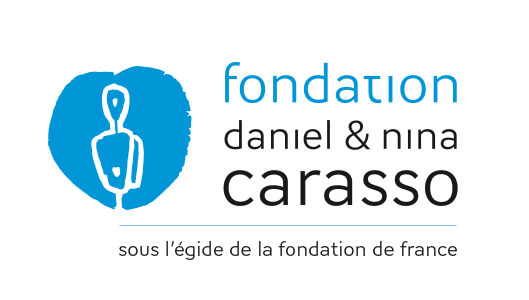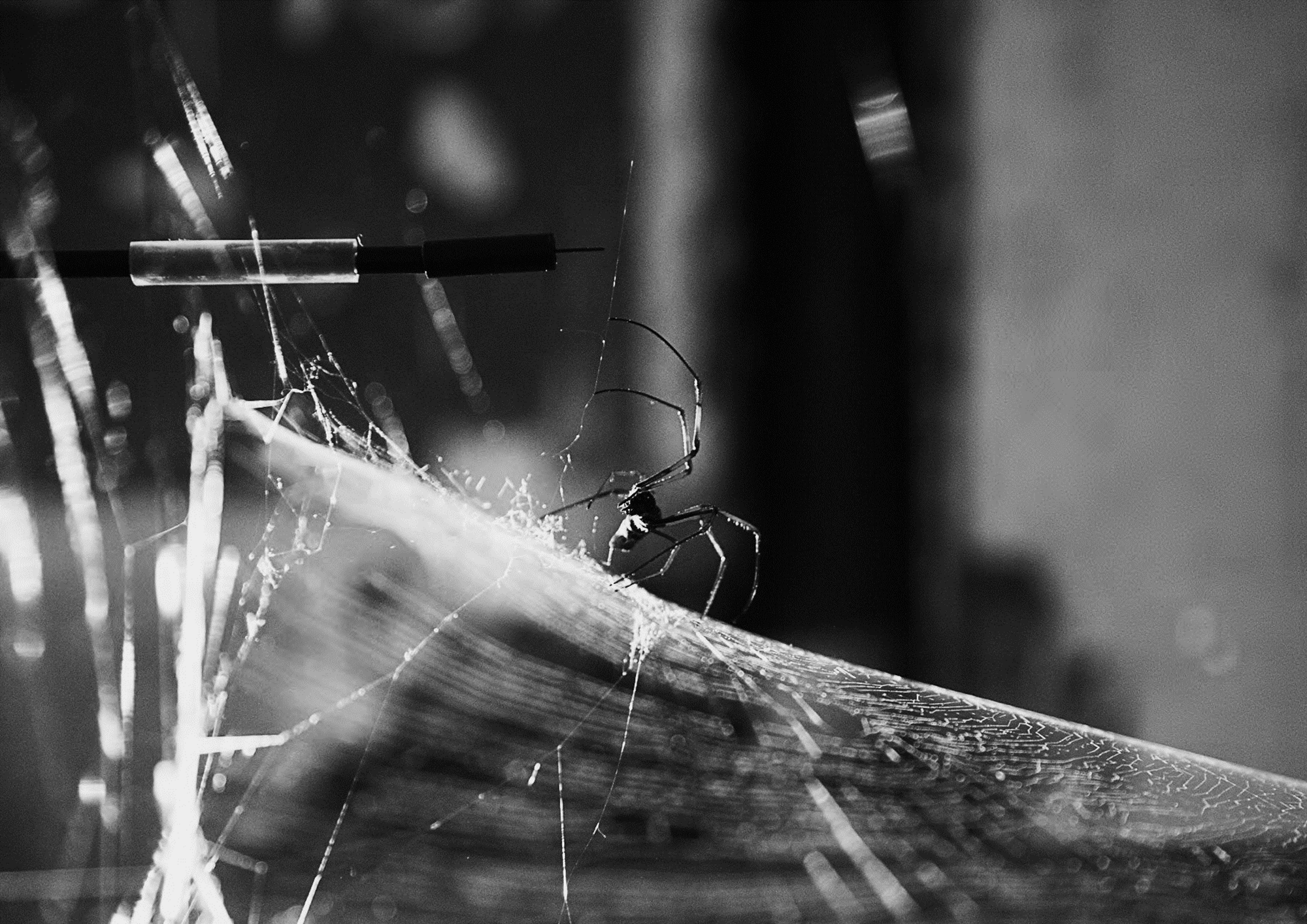This symposium brings together thinkers from various disciplines—arachnologists, biologists, historians and philosophers of science and media, composers— to think with, about and near spiders and their webs. It considers the actual spiders around us—their bodies, cognitive and perceptive realms—as well as the ways knowledge about these animals has been produced, shared, and how this knowledge has triggered further investigations and inspired other areas of research – such as Tomás Saraceno’s experiments with spider web hybridities, or with possibilities for interspecies communication. Simultaneously, the symposium explores the symbolic and affective dimensions of how we look at spiders, and how, by paying renewed attention to them, we might discover new threads of connectivity.
TALKS / 2pm – 7pm
The conversations are in English.
Introduced by Rebecca Lamarchel-Vadel and Tomás Saraceno.
Curated and moderated by Filipa Ramos
Keynote by Vinciane Despret
With : Frédérique Aït-Touati, Mitchell Akiyama, Alex Jordan, Jussi Parikka, Christine Rollard and Gabriele Uhl
The spider presents as a figure of entanglement—an eight-legged arachnid that has lived on this Earth for more than 380 million years, with more than 45,000 species distributed across a multitude of habitats worldwide. The spider’s senses are extended through their webs: the complex silk architectures that, are both actual material and sensorial systems, and delicate metaphors for entanglement.
CONCERT JAMMING WITH SPIDERS / from 7:30pm
CONCERTO POUR ARACHNIDES by Eliane Radigue
With Carol Robinson, Bertrand Gauguet, Julia Eckhardt, Yannick Guedon and Holocnemus pluchei.
Eliane Radigue proposes a sequel of her Occam Ocean series, a meditative sound exploration that she started in 2011. Using only low frequencies instruments or voices tonalities – the ones that spiders are likely to be hearing – the musicians perform solos, duets and quartets, playing very long and continuous notes with the hope to trigger their reactions and play live with them.
OCCAM XXIII, for Bertrand Gauguet , Saxophone (new piece)
OCCCAM River XIX, for Julia Eckhardt and Yannick Guedon, Alto, Baryton.
OCCAM River XXII, for Carol Robinson and Bertrand Gauguet, clarinette basse, saxophon (new piece)
OCCAM XXII, for Yannick Guedon,
OCCAM delta XVI, all musicians, quatuor (new piece)
In co-production with the Festival d’Automne à Paris.
These conversation sessions are made possible thanks to the support of

Lisbon-born Filipa Ramos is a writer and editor based in London, where she works as Editor in Chief of art-agenda. She is a Lecturer in the Experimental Film MA programme of Kingston University and in the MRes Art:Moving Image of Central Saint Martins, both in London, and collaborates with the Master Programme of the Institut Kunst, Basel. Ramos is co-curator of Vdrome, a programme of screenings of films by visual artists and filmmakers. She was Associate Editor of Manifesta Journal and contributed for Documenta 13 (2012) and 14 (2017). She has recently edited Animals (Whitechapel Gallery/MIT Press).
Vinciane Despret is a Belgian philosopher of science. She is Associate Professor at the Department of Philosophy of the University of Liège. A foundational thinker for the consolidating field of animal studies, Despret’s transdisciplinary approach is located across philosophy of sciences and practices of knowledge, ethology and anthropology. Her research focuses on the relationship between observers and the observed during the conduct of scientific research. Investigating “the political consequences of our theoretical choices”, she undertakes a critical understanding of how science is fabricated, following scientists doing fieldwork and observing how they actively relate to their objects of study.
Frédérique Aït-Touati is a specialist in comparative literature and history of sciences. She is a member of the Centre de recherches sur les arts et le langage (CNRS-EHESS). She is interested in the poetics of the scientific genres and the relationship between fiction and knowledge, from both historical and contemporary perspectives. Her first, award-winning book (Fictions of the Cosmos. Science and Literature in the Seventeenth Century, 2011) offers an account of how astronomers made themselves interpreters of the heavens in the age of telescopic discovery. Her recent publications include Histoires et savoirs (2012, co-edited with Anne Duprat), on science and narrative in the early modern period, and Le Monde en images. Voir, représenter, savoir, de Descartes à Leibniz (2015, with Stephen Gaukroger), on ‘picturability’ and the limits of representation in the 17th century. Her next book explores new representations of the Earth (Terra Forma, B42, 2019). She studied at the Ecole Normale Supérieure and Trinity College, Cambridge. She taught at Paris IV-Sorbonne (2004-2007) and University of Oxford (2007-2014).
Mitchell Akiyama is a Toronto-based scholar, composer, and artist. His eclectic body of work includes writings about sound, metaphors, animals, and media technologies; scores for film and dance; and objects and installations that trouble received ideas about history, perception, and sensory experience. Akiyama holds a PhD in communications from McGill University and an MFA from Concordia University. He is Assistant Professor of Visual Studies in the Daniels Faculty of Architecture, Landscape, and Design at the University of Toronto.
Alex Jordan is a Principal Investigator (Group Leader) at the Max Planck Institute Department of Collective Behaviour; an Associate Editor of The American Naturalist; and maintains a position as Senior Research Fellow at the University of Texas at Austin. Jordan studies the social and collective systems of various animals, from insects and spiders, to fish, up to humans—the ways single individuals come together to form much larger groups, and the rules of interaction that govern how these groups behave. His research program encompasses in-depth field studies, molecular genetics, and neurobiological approaches to understand both the mechanisms and the outcomes of social interactions.
Jussi Parikka is Professor at the Winchester School of Art (University of Southampton) and Docent of Digital Culture Theory at the University of Turku. His research has addressed a wide range of topics contributing to a critical understanding of network culture, aesthetics and media archaeology of contemporary society. His books include the media ecology-trilogy Digital Contagions (2007, 2nd. ed 2016), the award-winning Insect Media (2010) and most recently, A Geology of Media (2015), which addresses the environmental contexts of technical media culture and was continued in the short booklet A Slow, Contemporary Violence: Damaged Environments of Technological Culture (2016).
Christine Rollard is a French biologist and arachnologist. She is Professor and Researcher at the National Museum of Natural History in Paris, where she is responsible for the conservation of the spider collections, educational programmes to schools and general audiences. She has authored about fifty publications on spiders. Rollard’s scientific activity has focused bio-ecology, fauna and systematics: identifying and ranking spiders. She has worked in different geographical areas, participating in about fifteen biodiversity study programs, in France (Brenne, Auvergne, Normandy, Mercantour, Corsica), Overseas France (Guadeloupe, Martinique and Réunion), Africa (Guinea and Comoros) and Vanuatu (Santo).
Biologist Gabriele Uhl is Professor of General and Systematic Zoology at Greifswald University in Northern Germany. Her research focuses in Zoology, Evolutionary Biology and Animal Communication. The current projects in her lab concern reproductive behaviour and sexual selection, chemical communication, plasticity of behaviour and brain structures, as well as adaptation to new environments, with a focus on spiders. Apart from spider topics, the lab has also explored aspects of genital morphology and mating strategies in beetles, odonates, heel walkers, grasshoppers and flies. Uhl has also researched spider phobia in humans. She is Senior Editor for invertebrates for the Journal of Zoology.
Éliane Radigue is a French electronic music composer whose work has had a profound impact on extended technique and minimalism. She began working in the 1950s, studying with musique concrete pioneers Pierre Schaeffer and Pierre Henry, and her first compositions were presented in the late 1960s. Until 2000, her musical works were almost exclusively created on a single synthesizer, the ARP 2500 modular system and tape. Following a deep engagement with Tibetan buddhism that began in 1975, Radigue released some of her best known works, Adnos I, II, III (1975-1979), Jetsun Mila (1987) and Trilogy on Death, Intermediate States (1988-1993). Since 2001 she has composed mainly for acoustic instruments: first Naldjorlak, her grand trio for two basset horns and cello, and now the ever-expanding OCCAM OCEAN series of solo and ensemble pieces, which come together in orchestral formations. In honour of her contributions to electronic music and sound art, Radigue was awarded Prix Ars Electronica’s Golden Nica in 2006.
Peter Jäger is a German arachnologist, and current Head of Arachnology at the Senckenberg Research Institute and Natural History Museum in Frankfurt, Germany. He began collaborating with Tomás Saraceno in 2009, assisting the artist in identifying the best spider species (Latrodectus mactans or Black Widow spider) whose web could be used to develop what would later become Saraceno’s Spider Web Scan technique for creating 3d models of complex spider webs. Jäger’s research focuses on the taxonomy of spiders, and he has described more than 330 spider species as new to science – including Heteropoda davidbowie, which he named in honour of the singer David Bowie. In 2001, he received special media attention when he described the world’s largest known spider, Heteropoda maxima, a Laotian spider with a leg span of up to 30 cm. Jäger founded the Asian Society of Arachnology (2012) and hosted congresses in Germany and Laos. He was president of the German speaking Arachnological Society (2004–2010), council member of the International Society of Arachnology (2004–2010), and is associate editor (Zootaxa) and editorial board member (Acta Arachnologica Sinica, Arachnology letters). He is co-editor of the World Spider Catalog, German correspondent of the International Society of Arachnology and expert board member of ‘Spiders of Europe’.
Roland Mühlethaler holds a PhD in Zoology with an expertise in vibrational communication in insects and spiders. He works as a research associate at Tomás Saracenos’ studio in Berlin, where he is deeply involved in Saraceno’s research into vibrational signalling in spiders, and in the capacity of the spider/web to propagate vibrational signals. He previously worked as a biotaxonomist at the Natural History Museums in Basel, Cardiff, Paris and Berlin. His other research interests include the phylogeny and taxonomy of Hemiptera (mainly Cicadomorpha), and the functional morphology of Hemiptera.


